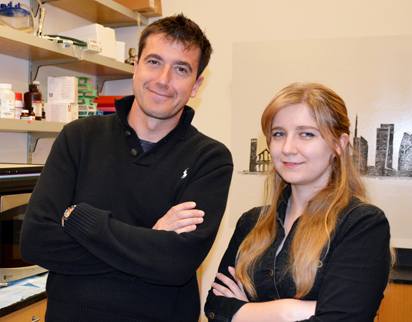Massive Chromosome Fusions? Neurons Don’t Care
TSRI Researchers Take Closer Look at Possible Culprit in Neurological Disorders
By Madeline McCurry-Schmidt

TSRI Associate Professor Eros Lazzerini Denchi (left) led the new study with TSRI Graduate Student Anastasia Lobanova (right) and co-senior author TSRI Associate Professor Anton Maximov (not pictured). (Photo by Madeline McCurry-Schmidt.)
Brain cells appear less vulnerable to DNA damage than previously thought, according to a new study led by scientists at The Scripps Research Institute (TSRI). In fact, adult cells in most regions of the brain appear to function normally even when their chromosomes are deprived of protective caps, called telomeres.
“This was striking. Ninety-nine percent of neurons could not care less about damaged chromosomes,” said TSRI Associate Professor Eros Lazzerini Denchi, who co-led the study with TSRI Associate Professor Anton Maximov.
This surprising discovery, published recently in the journal Genes & Development, may be important for understanding the progression of neurological disorders linked to telomere dysfunction, such as cognitive defects, seizures and developmental delays.
Using a mouse model designed to have dysfunctional telomere, the researchers confirmed that—as previously shown—developing cells do indeed need telomeres to protect their chromosomes early on in development. In essence, telomeres protect the blueprints for the construction of neurons, the nerve cells that relay nerve impulses throughout the brain and body. Without telomeres, chromosomes, which carry a cell’s genetic information, become fused together, triggering cell death.
The researchers also expected to see cell death in adult cells with damaged telomeres, so they were surprised to find that neurons seemed to function normally if telomeres were damaged later in development, following cell division. Neurons with this defect could still build effective brain circuits, receive and send signals, and carry out proper gene expression.
“These are active cells. Even though they’ve already divided, they are always doing processes,” said study first author Anastasia Lobanova, a graduate student in the Lazzerini Denchi lab. “And they don’t seem affected by fused chromosomes.”
The researchers did notice an interesting difference in a brain region called the dentate gyrus, one of the few regions that continues making new neurons throughout life. While cells in this region appeared normal without telomeres, there were fewer cells than expected. A lack of telomeres appeared to halt the growth of new neurons, a process called adult neurogenesis. Whether cells were affected depended on what stage of cell division they were in when they were hit by telomere dysfunction.
Lobanova said this could be a clue to why there is so much variation in the age of onset and severity of certain neurological diseases—patients may have cells at different stages when DNA damage occurs.
The new finding also hint at a possible cause for a phenomenon known as “chemo brain,” where patients undergoing chemotherapy sometimes experience memory loss. Just like telomere dysfunction, chemotherapy may be affecting adult neurogenesis in the dentate gyrus.
“Defects with memory are consistent with defects in the dentate gyrus,” said Lazzerini Denchi. “That would be an interesting subject to look into.”
In addition to Lazzerini Denchi, Maximov and Lobanova, the study, “Different requirement of functional telomeres in neural stem cells and terminally differentiated neurons,” were Robert She of TSRI; Simon Pieraut, previously of TSRI, now at the University of Nevada, Reno; and Charlie Clapp, previously of TSRI, now at JVT Research & Development Corporation.
The study was supported by The Pew Charitable Trusts and the National Institutes of Health (grants AG038677 and R01NS087026).
Send comments to: press[at]scripps.edu













